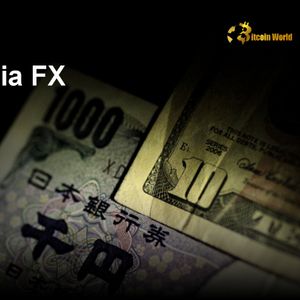BitcoinWorld Asia FX Firms: Japanese Yen Surges on Strong Data Amid Easing Geopolitical Risk In the dynamic world of global finance, events far beyond the crypto sphere can significantly impact market sentiment and capital flows. Understanding macro trends, like those affecting Asia FX markets, provides crucial context for the broader financial landscape. Recently, Asian currencies showed strength, influenced by a combination of factors, including reduced geopolitical tensions and significant economic data releases. How Did Easing Geopolitical Risk Impact Asia FX? Geopolitical events often cast a long shadow over financial markets, driving uncertainty and volatility. A key development impacting Asia FX was news indicating a de-escalation of immediate tensions between the US and Iran. When US President Trump stated there would be no immediate military strike following previous hostilities, it signaled a potential cooling of the situation. This reduction in Geopolitical Risk typically encourages investors to move away from safe-haven assets and back into riskier, or growth-sensitive, currencies and markets. The Market Reaction across Asia was noticeable. Several regional currencies saw gains against the US Dollar as risk appetite improved. This shift reflects how quickly markets price in changes to global stability, impacting everything from major currency pairs to emerging market flows. Why Did the Japanese Yen React to Japan CPI Data? While geopolitical factors were at play, domestic economic data provided another strong catalyst, particularly for the Japanese Yen . Japan released its latest Consumer Price Index (CPI) data, which came in hotter than expected. CPI is a key measure of inflation, tracking the average change over time in the prices paid by urban consumers for a market basket of consumer goods and services. Here’s why the Japan CPI reading was significant: Inflation Expectations: Higher-than-forecast inflation data raises the probability that the Bank of Japan (BOJ) might consider tightening monetary policy sooner than previously anticipated. Monetary Policy Implications: A central bank tightening policy (e.g., raising interest rates or scaling back stimulus) typically makes a country’s currency more attractive to foreign investors seeking higher yields. Yen Strength: The prospect of a potential shift in BOJ policy provided strong support for the Japanese Yen , causing it to appreciate against many other currencies, including the US Dollar. This demonstrates the powerful link between economic indicators like Japan CPI and currency valuations. Traders and analysts closely watch these releases for clues about future central bank actions and their potential impact on interest rate differentials. What Was the Overall Market Reaction in Asia? The combination of reduced Geopolitical Risk and the specific catalyst from Japan CPI led to a generally positive Market Reaction across Asia FX . While the Japanese Yen was a standout performer due to its direct link to the inflation data, other regional currencies also benefited from the improved risk sentiment. Key observations included: Currencies like the South Korean Won, Singapore Dollar, and Australian Dollar showed resilience or made gains. Investors appeared less inclined towards traditional safe havens like the US Dollar and Gold, at least temporarily. Trading volumes and volatility levels reflected the news flow, with initial sharp moves followed by consolidation. Understanding this Market Reaction is vital because shifts in global liquidity and risk sentiment can ripple through all asset classes, including digital assets. When traditional markets show increased risk appetite, it can sometimes correlate with greater willingness to invest in less conventional assets. Actionable Insights for Navigating FX Markets For those tracking global markets, including how they might indirectly influence the crypto space, these events offer valuable lessons: Stay Informed on Geopolitics: Geopolitical tensions can emerge rapidly and significantly impact currency and commodity markets. Monitor major global hotspots and political developments. Watch Economic Calendars: Key economic data releases (like CPI, GDP, employment figures) from major economies and central bank decisions are primary drivers of currency movements. Pay particular attention to data from countries with significant global trade ties. Understand Interconnectedness: Recognize that FX markets are influenced by a complex interplay of factors, including economic data, central bank policy, political stability, and global risk sentiment. These factors collectively contribute to the overall financial environment. While predicting market moves is impossible, staying informed about these core drivers provides a better framework for understanding market behavior and potential shifts in the broader financial ecosystem. Conclusion: A Glimpse into Market Sensitivity The recent performance of Asia FX serves as a clear example of how quickly currency markets react to changes in both Geopolitical Risk and domestic economic fundamentals. The easing of immediate US-Iran tensions provided a tailwind for risk sentiment, while the hotter Japan CPI data specifically propelled the Japanese Yen higher. This swift Market Reaction underscores the sensitivity of FX pairs to unexpected news and data. Tracking these developments offers valuable insights into global liquidity, risk appetite, and the macroeconomic forces that shape the financial world. To learn more about the latest Forex market trends, explore our article on key developments shaping global currency valuations. This post Asia FX Firms: Japanese Yen Surges on Strong Data Amid Easing Geopolitical Risk first appeared on BitcoinWorld and is written by Editorial Team



















